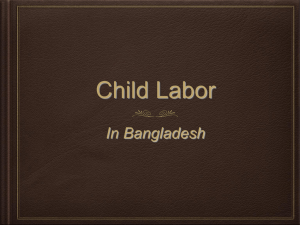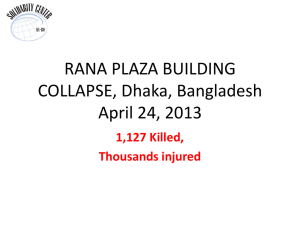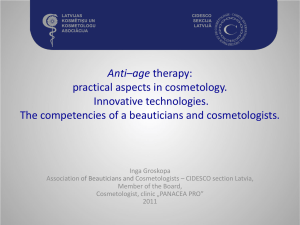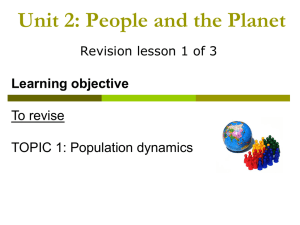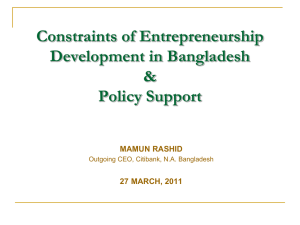All_slides_side_event - European Union @ United Nations
advertisement
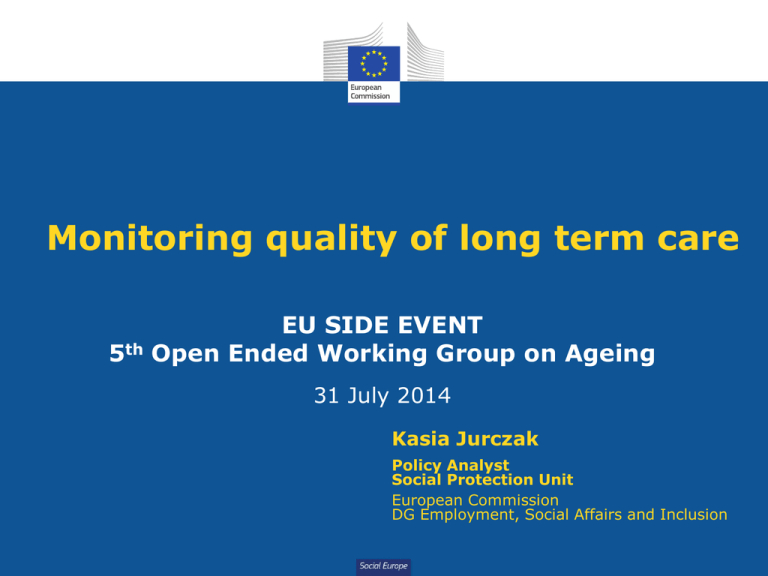
Monitoring quality of long term care 5th EU SIDE EVENT Open Ended Working Group on Ageing 31 July 2014 Kasia Jurczak Policy Analyst Social Protection Unit European Commission DG Employment, Social Affairs and Inclusion Social Europe Approach to long-term care in the EU • Long-term care as well as health care are EU Member States' responsibility • EU's role is to coordinate – Social Protection Committee • Focus on quality, access and affordability Social Europe What have we done so far in this field? • Quality of care and prevention of elder abuse and neglect • Funding of "pilot projects" on preventing elder abuse: data collection, standards development; • Awareness raising: • conference with OHCHR (2013); • seminar with AGE Platform Europe and CoE (2014) • Report with OECD "A good life in old age?" Social Europe Why is quality of LTC important? Aspects of quality of LTC 1) Recognise that users/older persons need more voice and control over their lives 1) effectiveness and safety 2) the costs of care services keeps on growing from 1,6% of GDP across the OECD to at least double this figure by 2050; -> cannot afford to get it "wrong" 2) person-centeredness and responsiveness 3) care-coordination 3) governments have the responsibility to protect older people from potential abuse; Social Europe What measures are collected? Clinical quality: - elderly falls and fractures - bed sores - medication use - weight loss - mental health outcomes (minority of countries): depression; - use of physical restraints in nursing homes Responsiveness and carecoordination - user experience in LTC - waiting times for LTC - avoidable admissions for chronic conditions among the elderly patients Quality of life: - Patient and user experience: - consumer choice, - autonomy, - dignity, - comfort, - security, - relationships and social activity; Social Europe Main regulatory approaches • Regulatory standards: • setting minimum standards on inputs (labour, infrastructure) • processes (management of medication, record keeping, infection control); • necessary for accreditation or authorization to practice • Market incentives: accreditation or certification of care facilities • Accreditation and standards for home care and community care services are less common, but can be found in FR, JP, PT, ES, US; • Staff training/continuous learning – very rarely required • More recently focus on outcomes: quality of life, choice, dignity – mainstreaming a rights-based approach to care; Social Europe Enforcement • Enforcement is not strong enough • Expensive to monitor compliance; expensive to adhere to norms and protocols; • Strict regulation has limits • stifle innovation, limit autonomy of persons using the services (risk aversion); • focus on what is regulated rather than broader quality issues; • Better standardisation for higher quality? • How to bring in the rights based approach to care monitoring? Social Europe Older Persons Project Side event 5th OEWG-A 31 July 2014 Claudia Mahler GIHR Mapping Report - Sept 2013 • Many NHRIs in Europe work to promote and protect older persons’ human rights • Multifaceted approach: – Working with rights holders – Raising awareness of human rights standards – Addressing structural issues • Some uncertainty on future work, due to limited resources Member Survey – April / May 2014 • Members’ recent work • Members’ planned work • Ideas for the Project – Objectives, content, methodology, output, outcomes, resources, stakeholders Project Objectives and Scope • Embed human rights standards and approach in care of older persons – Increase human rights protection for older persons – Clarify which international hr standards apply on older persons in care – Raise awareness – Development of practical tools – Recommendations to various actors – Spread best practice for supporting and monitoring hr for older persons Take into account • Relationship with home care • Rights of care staff • Impact of the economic crisis • Diversity of older persons • Relationship with OPCAT and CRPD • Developments at the OEWG on ageing Activities • • • • • • Desk based research Monitoring activities Awareness raising Recommendations Evaluation Follow up Human rights approach requires increased: – Empowerment • Awareness-raising for rights holders and advocates • Advocacy that involves rights holders – Accountability • Embedded in inspection regimes and indicators (NHRI) • Embedded in public procurement and policy development (state and EU bodies) – Ability • Staff training and qualifications • Human rights impact assessments Open-Ended Working Group (OEWG) on Ageing UN HQ New York 31st July 2014 MONITORING CARE OF OLDER PERSONS FROM A HUMAN RIGHTS PERSPECTIVE Presented by: Kazi Reazul Hoque Full Time Member National Human Rights Commission Bangladesh And APF Speaker APF CONFERENCE ON RIGHTS OF OLDER PERSONS IN SYDNEY FROM 13-15 MAY 2014 RIGHTS OF THE ELDERLY: BANGLADESH PERSPECTIVE The article 15 of the Constitution is directly concerned with the elderly rights of the People’s Republic of Bangladesh. Constitutional Provisions a) The provision of basic necessities of life, including food, clothing, shelter, education and medical care; b) The right to work, that is the right to guaranteed employment at a reasonable wage having regard to the quantity and quality of work; c) The right to reasonable rest, recreation and leisure; and d) The right to social security, that is to say, public assistance in case of undeserved want arising from unemployment, illness or disablement or suffered by widows or orphans or in old age, or in other such cases. TWO INSTRUMENTS TO ENSURE CARE AND HUMAN RIGHTS IN BANGLADESH 1. National Ageing Policy 2013 2. Parents Maintenance Act 2013 OLD AGE CARE AND HUMAN RIGHTS •Getting care at old age is a fundamental necessity •Old age is related to vulnerability and disability, therefore care and support mechanism is the responsibility of the state. Commissioner Hoque is visiting BAAIGM to see the care situation of the older persons CARE SYSTEM OF OLDER PERSONS IN BANGLADESH A. Institutional Care •Care from the Government (There exist many initiatives to support and care the older persons like old age allowance) Old Age Support from the Government Old Age Allowance 400 taka (USD 6 approx) per person per month Disable allowance: 500 taka (USD 7 approx) per person per month Freedom Fighters Allowance (All are Ops) : 5000 Tk. ( USD 65) per month Inclusion in the academic curriculum regarding care giving of the older persons by the a. Family level b. School level b. Community level INSTITUTIONAL CARE (CONTD…) A. Institutional Care Bangladesh Association of Ageing and Institution of Geriatrics Medicine-BAAIGM Bayoska o Shishu Punorbason Kendra (Boshikpur) Sir William Beveridge Foundation CARE SYSTEM OF OLDER PERSONS IN BANGLADESH B. Traditional Care (There is very good traditional support system in Bangladesh) C. Care from the community (organizations like Ageing Support Forum takes various programs on Old Age Care) D. Care from the family E. Private Care (Nursing Home, Physiotherapist) SOME ORGANIZATIONS WORKING FOR OLD AGE CARE Bangladesh Association for the Aged and Institute of Geriatric Medicine (BAAIGM) Commissioner Hoque talking to the older women of BAAIGM HELPAGE INTERNATIONAL Project launching of HelpAge International Dhaka 2014 SOME ORGANIZATIONS WORKING FOR OLD AGE CARE Sir William Beveridge foundation Dr. Atique delivering speech at Dementia Conference organized by SWBF BANGLADESH GERONTOLOGICAL ASSOCIATION AGEING SUPPORT FORUM Warm Cloth Distribution Program of Ageing Support Forum for OPs January 2014 NHRC MONITORING TO THE CARE SYSTEM Prof. Mizanur Rahman, Chairman of NHRC visiting Older Persons after the communal incident of Ramu, Bangladesh NHRC commissioner Hoque along with NHRC Officials in a meeting with Mr. Zahid Mukul, the Founder of BOSPUK, shelter home of nearly 500 Ops near Dhaka city ROLE OF NHRC Maintaining liaison with the GO and NGOs working with older persons Awareness creation to the community to uplift the rights of the older persons Support and assist older care initiatives (Ageing support forum) Monitoring whether proper food, medicare and other standard facilities are given (jails, hospitals, and shelter homes.) Advocating to the government to increase Old Age Allowance, number of beneficiaries and area of coverage Proposing for the insurance policy for the older persons to the government EXAMPLES OF CARE FOR OLDER PERSONS IN BANGLADESH Institutional (Old Home) 1. Sir Willium Beveridge Foundation 2. BAAIGM 3. Ageing Support Forum 4. Elderly and Child Rehabilitation Centre Private Care 1. Nursing home, 2. physiotherapist Traditional Family Care A caregiver providing residential service in Dhanmondi, Dhaka BANGLADESH STRENGTH AND CHALLENGES STRENGTH 1. Old Age Allowance Scheme of Government 2. National Ageing Policy 2013 3. Parents Maintenance Act 2013 4. Govt. Support to the different NGOs and philanthropic organizations 5. Uphold the religious ,family and social Values . Therefore protection for older persons in care is built in. 6. Very rich Values of Ethnic community in regards to respect to older persons 7. Involvement of the older persons in decision making in regards to ESCR as well as Civil and Political arena. 8. Disregard, ignorance, violence against OPs are highly criticized in the society. 9. In resolving any religious, social and familiar dispute, opinion of OPs are highly honored and accepted. 10. Bondage of Extended family and community is very strong in care giving. BANGLADESH STRENGTH AND CHALLENGES 1. 2. 3. 4. 5. 6. 7. 8. CHALLANGES Implementing National Ageing Policy 2013 Implementing Parents Maintenances Act 2013 Rate of increase in the number of Older Persons Research Constraints Attitude of general people not being aware of old age Proper Distribution of Old Age Allowance Awareness and training of rural and urban Older Persons to cope with the changing situation Isolation of the organizations working with old age issues. Coordination among the GO NGO initiatives COMMENT ON EU PROJECT OF HR ON CARE 1. As institutional care and residential care have been increasing in Bangladesh, Human Rights issues in CARE will be of great importance. Monitoring of caregivers and setting up new standards in providing care to older persons is a necessity. 2. Traditionally, the family norms and values of Asian countries are different than the norms and values of Europe. Therefore, the Human Rights approach to care-giving in these two regions should be different. 3. There are more than 12 million older persons in Bangladesh. Therefore, awareness raising and structural issues of implementing care standards and monitoring will be vital. 4. Study from Bangladesh shows that a significant number of neglect and abuse exists in our society. Therefore, HR issues should be properly monitored in residential and home Care. COMMENT ON EU PROJECT OF HR ON CARE 5. As, in some country, poverty exists in a large scale, the impact of economic crisis should be properly investigated before implementing any such project. 6.Regarding the monitoring and care standards, intervention with policy makers as well as the organizations that work with Ageing issue is necessary. 7. Awareness, monitoring, follow up and other activities should be administrated from a different and independent office in the country. 8. Experts from ageing sector (academicians, researchers) should be included in the Pilot group. 9. Mandatory retirement is a gross violation of human rights. Therefore, unemployment issues of older persons will have relation with receiving Care.


